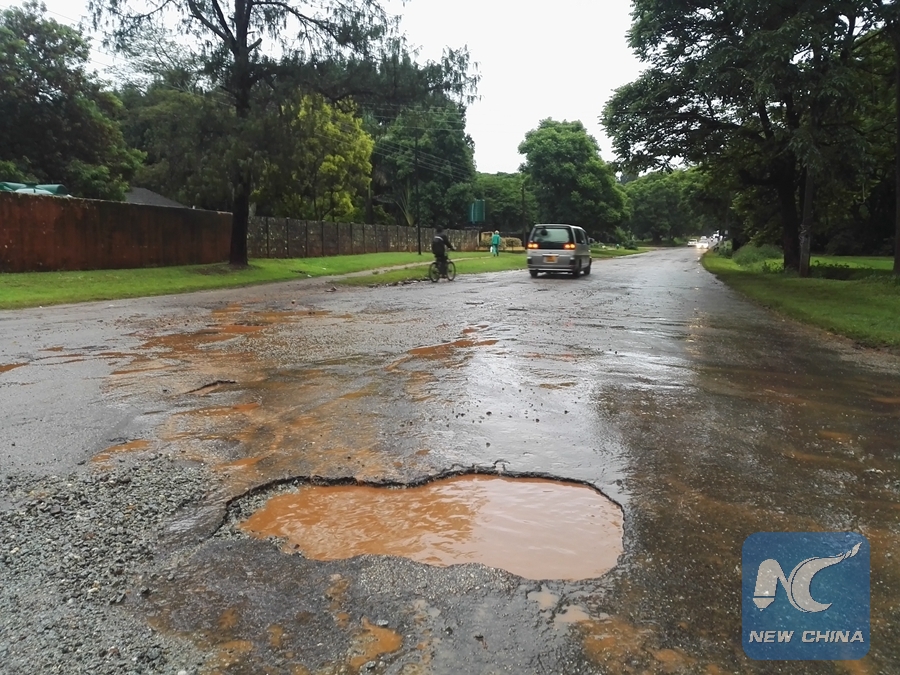
Cars are driving on Arcturus Road which is full of potholes in capital city Harare, Zimbabwe, on January 18, 2017. (Xinhua/Zhang Yuliang)
HARARE, Jan. 18 (Xinhua) -- Harare's suburban roads have become so pothole riddled that motorists are now mapping their trips around the more navigable ones to avoid damaging their vehicles.
Potholes are a perennial problem in the city during the rainy season with Harare City Council failing to patch them amid concerns of poor remittances from a statutory body that collects fees for road construction and maintenance throughout Zimbabwe.
"It is no longer a matter of jumping onto your car and driving to your destination. You must now plan which route to use, no matter how long, so that you save your vehicle's suspension from damage.
"In fact, some of the shorter routes end up being longer in terms of time as they are hardly passable," said motorist Gift Chatindo.
Pictures on social media show gapping potholes along many roads with vehicles driving on the wrong side of the road.
Where possible, motorists completely avoid the roads and create their own side roads, which is an offence according to Zimbabwe's motor traffic regulations.
The state of some roads no longer requires mere patching of potholes but complete resealing and reconstructing, according to city engineers.
About 25 percent of roads need rehabilitation and 75 percent preventive maintenance.
Pothole patching is also difficult during the wet season, so motorists will have to negotiate their way through the maze until the rains end.
Harare Mayor Bernard Manyenyeni recently accused the Zimbabwe National Roads Authority (ZINARA) of remitting much less than the city's requirements for roads rehabilitation yet it rakes in millions from motor vehicle licenses for the city's motorists.
Prior to the establishment of ZINARA by the government in 2001 with the aim of enhancing the road network system throughout the country, local authorities collected license fees for motor vehicles domiciled within their areas and used the funds for road maintenance and construction.
ZINARA took over this function and now disburses various amounts to the local authorities as it deems fit.
Manyenyeni told a local newspaper recently that residents should raise complaints of poor road maintenance with ZINARA since it was responsible for disbursing the funds for road maintenance.
"We should be getting about 40 million (U.S.) dollars per year from ZINARA for road maintenance but they are only remitting 1 million dollars which is not enough for standard repairs," he said.
According to Harare's Director of Engineering Services Phillip Pfukwa, the council needs 200 million U.S. dollars a year for road maintenance but gets little from ZINARA.
For instance, in 2014 ZINARA disbursed between 250,000 and 300,000 dollars against a budget of 15 million dollars, he said.
The council has as a result been mulling taxing local motorists in a bid to raise funds for road maintenance, but the motorists have reacted angrily to the proposal.
Tire fitters are also making brisk business as motorists plunge into invisible water-filled potholes and puncture their tires.
One fitter said he had noticed a surge in the number of motorists bringing tires for repairs while others sought replacements.
"I keep old tires which some motorists would have replaced with new ones for sale to those who are desperate. An old tire can sell for 20 dollars," he said.

